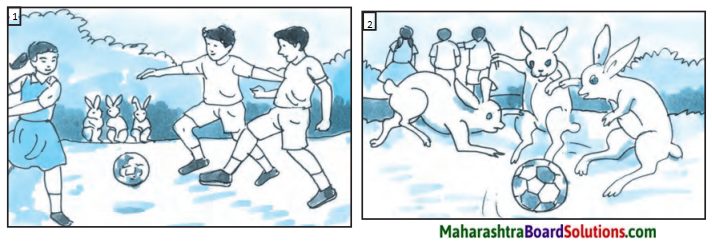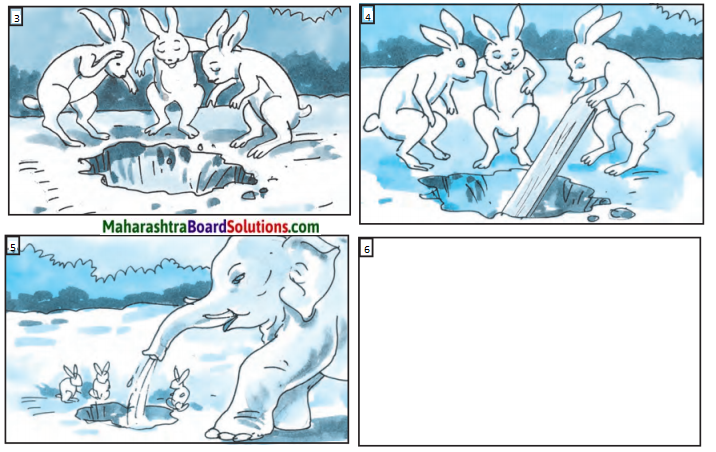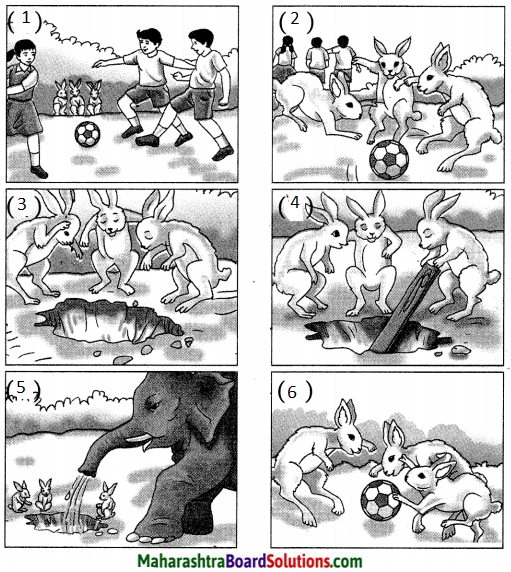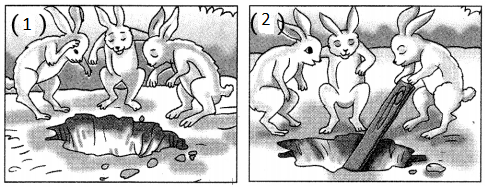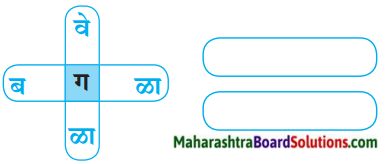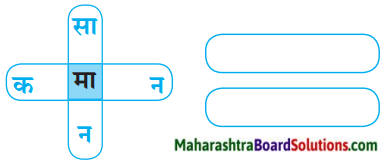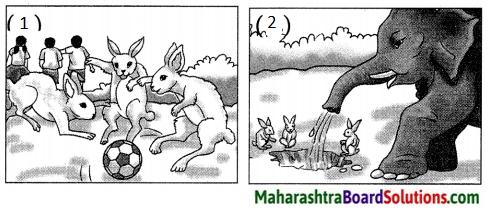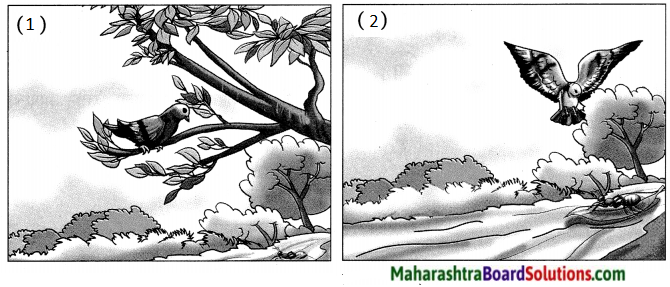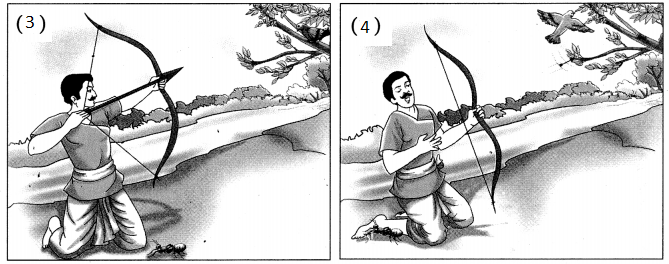Std 5 Hindi Lesson 25 मालतीची चतुराई Question Answer Maharashtra Board
Balbharti Maharashtra State Board Class 5 Marathi Solutions Sulabhbharati Chapter 25 मालतीची चतुराई Notes, Textbook Exercise Important Questions and Answers.
5th Std Hindi Poem Maltichi Chaturai Question Answer
5th Standard Marathi Digest Chapter 25 मालतीची चतुराई Textbook Questions and Answers
1. खालील प्रशनांची उत्तरे लिहा.
प्रश्न (अ)
मालतीला कोणत्या गोष्टीचे नवल वाटले?
उत्तरः
शेतावरून घरी आल्यावर मलण्णाने बैलांना घरी आणून गोठ्यात बांधले. त्यांना चारा, पाणी दिले. अतिश्रमाने थकून मलण्णा लवकर झोपला. सकाळी लवकर उठला. बाहेर जाताच त्याला गोठ्यात एकच बैल दिसला. दुसरा बैल कुठे गेला? मलण्णाने घाबरून मालतीला विचारले. मालतीला बैल नाहीसा झाल्याचे कळले, तेव्हा तिला या गोष्टीचे नवल वाटले.

प्रश्न (आ)
मलण्णा, डोक्याला हात लावून का बसला?
उत्तरः
मलण्णा व मालती एक गरीब शेतकरी जोडपे होते. या जोडप्याचा, गोठ्यात बांधलेल्या दोन बैलांपैकी एक बैल नाहीसा झाला होता. त्यांनी गावभर त्या बैलाचा शोध घेतला; पण त्यांना बैल मिळाला नाही. मलण्णा तर खूपच निराश झाला. काय करायचे? एकाच बैलावर शेती कशी करायची? या विचाराने मलण्णा डोक्याला हात लावून बसला.
प्रश्न (इ)
बैल चोरणारा माणूस मनातून का घाबरला?
उत्तर:
बैल चोरी झाला म्हणून मालती व मलण्णा दोघांनीही तालुक्याला जाऊन गुरांच्या बाजारातून बैल खरेदी करण्याचे ठरवले. गुरांच्या बाजारात फिरता फिरता मालतीला त्यांचा हरवलेला बैल दिसला; दोघेही बैलाजवळ आले. आपला बैल म्हणून मालतीने त्याला आंजारले, गोंजारले. “या माणसाने आमचा बैल चोरला,” असे म्हणत तिने आरडाओरडा करायला सुरुवात केली. आपली चोरी आता उघडी पडेल या विचाराने बैल चोरणारा माणूस मनातून घाबरला.
प्रश्न (ई)
मालतीने युक्ती करायचे का ठरवले?
उत्तरः
मालतीने आरडाओरडा करायला सुरुवात केली तेव्हा चोरानेही कांगावा केला की, मी तुमचा बैल कशाला घेऊ? मी या बैलाला लहानाचा मोठा केलाय. हा माझाच बैल आहे. मालतीच्या लक्षात आले की, चोर सहजासहजी आपल्याला बैल देण्यास तयार होणार नाही. म्हणून तिने बैल मिळवण्यासाठी युक्ती करायचे ठरवले.
प्रश्न (उ)
मालतीने कोणती युक्ती केली?
उत्तर:
गुरांच्या बाजारात मालती-मलण्णाला त्यांचा चोरलेला बैल दिसला. चोराला सांगूनही तो चोरीची कबुली दयायला तयार होईना, तेव्हा मालतीने झटकन बैलाच्या डोक्यावर हात ठेवला व त्याला प्रश्न विचारला, “सांग बरं, याचा कोणता डोळा अधूआहे, डावा की उजवा?” चोर म्हणाला, “माझ्या बैलाचा डावा डोळा अधूआहे.” यावर मालतीने ते तपासून घेऊ, असे चोराला म्हटले आणि चोर त्यात अडकला. कारण मालतीच्या बैलाचे दोन्ही डोळे चांगले होते. चोर पकडण्यासाठी मालतीने ही युक्ती केली.

प्रश्न (ऊ)
चोराची भंबेरी का उडाली?
उत्तर:
मालतीची युक्ती कामी आली आणि चोराची लबाडी उघड झाली. चोराने खोटेपणाने सांगितले की, “माझ्या बैलाचा डावा डोळा अधू आहे.” पण प्रत्यक्षात मात्र मालतीच्या बैलांचे दोन्ही डोळे चांगले होते. अशाप्रकारे लोकांसमोर चोराची लबाडी उघडकीस आल्यामुळे चोराची भंबेरी उडाली.
2. रिकाम्या जागा भरा.
प्रश्न 1.
रिकाम्या जागा भरा.
(अ) मालती ………….. बाहेर आली.
(आ) एका बैलावर ……….. कशी करायची?
(इ) तेवढ्यात मालतीला त्यांचा ……………… बैल दिसला.
(उ) बैलाभोवती लोकांची ………………….. जमली.
(ऊ) सगळ्यांनी मालतीच्या …………. कौतुक केले.
उत्तर:
(अ) झटकन
(आ) नांगरणी
(इ) हरवलेला
(उ) गर्दी
(ऊ) चतुराईचे
3. पटकन, झटकन यासारखे आणखी शब्द लिहा.
प्रश्न 1.
पटकन, झटकन यासारखे आणखी शब्द लिहा.
उत्तर:
- खटकन
- चटकन
- गटकन
- मटकन
- सटकन

4. आरडाओरडा, सहजासहजी, भाजीभाकरी हे जोडशब्द आलेली पाठातील वाक्ये लिहा.
प्रश्न 1.
आरडाओरडा, सहजासहजी, भाजीभाकरी हे जोडशब्द आलेली पाठातील वाक्ये लिहा.
उत्तरः
1. “या माणसाने आमचा बैल चोरला,” असे म्हणत तिने आरडाओरडा करायला सुरुवात केली.
2. हा चोर आपला बैल सहजासहजी देणार नाही.
3. त्याची पत्नी मालती हिने भाजीभाकरी केली होती.
5. मालतीच्या चतुराईचे सर्वांनी कौतुक केले. तुमच्या/मित्राच्या/मैत्रिणीच्या चतुरपणाचे कौतुक कधी झाले आहे का? घरी व वर्गात सांगा.
प्रश्न 1.
मालतीच्या चतुराईचे सर्वांनी कौतुक केले. तुमच्या/मित्राच्या/मैत्रिणीच्या चतुरपणाचे कौतुक कधी झाले आहे का? घरी व वर्गात सांगा.
6. खालील शब्दांचे विरुद्धार्थी शब्द पाठात शोधून लिहा.
प्रश्न 1.
खालील शब्दांचे विरुद्धार्थी शब्द पाठात शोधून लिहा.
(अ) खरेदी
(आ) लहान
(इ) डावा
उत्तरः
(अ) विक्री
(आ) मोठा
(इ) उजवा
7. खालील शब्द असेच लिहा.
प्रश्न 1.
खालील शब्द असेच लिहा.
दोन्ही, गोष्टी, विक्री, निरीक्षण, गर्दी, स्त्री.

उपक्रम:
आतापर्यंतच्या पाठांत आलेले जोडशब्द शोधा. ते ‘माझा शब्दसंग्रह’ वहीत लिहा.
Marathi Sulabhbharati Class 5 Solutions Chapter 25 मालतीची चतुराई Additional Important Questions and Answers
प्रश्न 1.
एक-दोन शब्दात उत्तरे लिहा.
- शेतकऱ्याचे नाव काय होते?
- शेतकऱ्याच्या पत्नीचे नाव काय होते?
- मलण्णाकडे किती बैल होते?
- मलण्णाने बैलांना काय दिले?
- जनावरांच्या बाजाराला काय म्हणतात?
- बाजारात जनावरांची काय सुरू होती?
- मलण्णा-मालतीने बैलाचा शोध कुठे घेतला?
- चोराने बैलाचा कोणता डोळा अधू आहे असे सांगितले?
- चोराला कोणाच्या ताब्यात दिले?
उत्तर:
- मलण्णा
- मालती
- दोन
- चारा-पाणी
- गुरांचा बाजार
- खरेदी-विक्री
- गावभर
- डावा
- पोलिसांच्या
प्रश्न 2.
रिकाम्या जागा भरा.
- दोन्ही बैलांना ………………….. बांधले.
- मीच याला लहानाचा मोठा केला असा तो ……………. करू लागला.
- त्याच्या मनात …………. निर्माण झाला.
- लोकांसमोर चोराची …………. उघडकीस आली.
- चोराला पोलिसांच्या …………… दिले.
उत्तर:
- गोठ्यात
- कांगावा
- गोंधळ
- लबाडी
- ताब्यात

एका वाक्यात उत्तरे लिहा.
प्रश्न 1.
मालतीने मलण्णाला शेतातून आल्यावर काय खायला दिले?
उत्तर:
मालतीने मलण्णाला शेतातून आल्यावर भाजीभाकरी खायला दिली.
प्रश्न 2.
सकाळी लवकर उठल्यावर मल्लण्णाने काय पाहिले?
उत्तरः
सकाळी लवकर उठल्यावर मलण्णाने पाहिले की, गोठ्यात एकच बैल आहे.
प्रश्न 3.
बैल खरेदी करण्यासाठी मालती व मलण्णा कोठे गेले?
उत्तर:
बैल खरेदी करण्यासाठी मालती व मलण्णा तालुक्याला गुरांच्या बाजारात गेले.
प्रश्न 4.
मालती व मलण्णाला त्यांचा बैल कुठे दिसला?
उत्तर:
मालती व मलण्णाला त्यांचा बैल तालुक्याला गुरांच्या बाजारात दिसला.
प्रश्न 5.
मालतीने आरडाओरडा का केला?
उत्तर:
मालतीने आरडाओरडा केला, कारण तिने आपल्या हरवलेल्या बैलाला ओळखले.

प्रश्न 6.
बैल चोरणाऱ्याने कशाप्रकारे कांगावा केला?
उत्तरः
“तुमचा बैल मी कशाला घेऊ?” हा माझाच बैल आहे. मीच याला लहानाचा मोठा केला आहे.’ अशाप्रकारे बैल चोरणाऱ्याने कांगावा केला.
प्रश्न 7.
मालतीने बैल चोरणाऱ्याला कोणता प्रश्न विचारला?
उत्तर:
“सांग बरं, याचा कोणता डोळा अधू आहे, डावा की उजवा?’ हा प्रश्न मालतीने बैल चोरणाऱ्याला विचारला.
प्रश्न 8.
लोकांसमोर कोणती गोष्ट उघड झाली?
उत्तरः
लोकांसमोर चोराची लबाडी उघड झाली.
थोडक्यात उत्तरे लिहा.
प्रश्न 1.
मालती व मलण्णा घरी आनंदाने का आले?
उत्तरः
मालतीने केलेल्या युक्तीमुळे चोरी पकडल्याबरोबर चोराची भंबेरी उडाली. सगळ्यांनी मालतीच्या चतुराईचे कौतुक केले आणि चोराला पोलिसांच्या ताब्यात दिले. आपला चोरीला गेलेला बैल, चतुराईने मिळाल्यामुळे मालती मलण्णा घरी आनंदाने आले.
व्याकरण व भाषाभ्यास:
1. कंसातील वाक्प्रचारांचा खालील वाक्यात उपयोग करून वाक्य पुन्हा लिहा. (भंबेरी उडणे, डोक्याला हात लावणे, अंजारणे गोंजारणे, कांगावा करणे, थकून जाणे, लबाडी करणे)
प्रश्न 1.
खूप वर्षांनी पाहिलेल्या नातवाला आजीने प्रेमाने थोपटले
उत्तरः
खूप वर्षांनी पाहिलेल्या नातवाला आजीने प्रेमाने अंजारले गोंजारले.
प्रश्न 2.
भुकंपामुळे झालेले नुकसान पाहून भुकंपग्रस्त विचारात पडले.
उत्तरः
भुकंपामुळे झालेले नुकसान पाहून भुकंपग्रस्तांनी डोक्याला हात लावला.
प्रश्न 3.
पोलिसांनी पकडलेला चोर मी चोरी केलीच नाही, असे खरे बोलण्याचा आव आणू लागला.
उत्तरः
पोलिसांनी पकडलेला चोर मी चोरी केलीच नाही, असा कांगावा करू लागला.
प्रश्न 4.
अचानक पाहुणे आल्याने आई खूप गोंधळून गेली.
उत्तरः
अचानक पाहुणे आल्याने आईची भंबेरी उडाली.
प्रश्न 5.
व्यापारी जास्त पैसा मिळवण्याच्या नादात नेहमीच खोटपणा करतात.
उत्तरः
व्यापारी जास्त पैसा मिळवण्याच्या नादात नेहमीच लबाडी करतात.

प्रश्न 6.
दिवसभर नृत्याचा सराव करून मुले दमून गेली.
उत्तरः
दिवसभर नृत्याचा सराव करून मुले थकून गेली.
प्रश्न 7.
समानार्थी शब्द लिहा.
- चतुराई
- पाणी
- पत्नी
- झोप
- नवल
- शोध
- झटकन
- सुरुवात
- कौतुक
- गोंधळ
- आनंद
- मन
- भांडण
- युक्ती
- बैल
- डोळा
- लबाडी
उत्तरः
- चातुर्य
- जल
- बायको
- निद्रा
- आश्चर्य
- तपास
- पटकन
- आरंभ
- स्तुती
- गडबड
- हर्ष
- चित्त
- वाद
- शक्कल
- वृषभ
- नेत्र
- फसवणूक
प्रश्न 8.
विरुद्धार्थी शब्द लिहा.
- सकाळ
- लवकर
- बाहेर
- हरवणे
- सुरुवात
- लक्ष
- गर्दी
- माझा
- विचार
- चांगले
- कौतुक
- आनंद
- घाबरट
- गोंधळ
- उघडे
- डावा
उत्तरः
- संध्याकाळ
- उशिरा
- आत
- मिळणे/सापडणे
- शेवट
- दुर्लक्ष
- पांगापांग
- तुझा
- अविचार
- वाईट
- निंदा
- दुःख
- धीट
- शांतता
- बंद
- उजवा

प्रश्न 9.
लिंग बदला.
- शेतकरी
- पत्नी
- बैल
- स्त्री
उत्तर:
- शेतकरीण
- पती
- गाय
- पुरुष
प्रश्न 10.
वचन बदला.
- घर
- गोठा
- बैल
- काम
- अंथरूण
- गोष्ट
- गाव
- तालुका
- जनावर
- युक्ती
- डोळा
- मन
- भांडण
- हात
- लबाडी
उत्तरः
- घरे
- गोठे
- बैल
- कामे
- अंथरुणे
- गोष्टी
- गावे
- तालुके
- जनावरे
- युक्त्या
- डोळे
- मने
- भांडणे
- हात
- लबाड्या
मालतीची चतुराई Summary in Marathi
पदयपरिचय:
मलण्णा व मालती हे गरीब शेतकरी जोडपे. त्यांचा एक बैल चोरीला गेला. आठवड्याच्या बाजारात मालतीने तो बैल चतुराईने कसा मिळवला याचे वर्णन या पाठात आले आहे.

शब्दार्थ:
- गोठा – गुरे बांधण्याची जागा – (shed for cattle)
- चारा – पशुपक्ष्यांचे अन्न (fodder)
- दमणे – थकणे (tired)
- बैल – वृषभ (a bull)
- झटकन – लवकर (quickly)
- नवल – आश्चर्य (a wonder)
- शोध – चौकशी (inquiry)
- गुरे – गाय, बैल इ. जनावरे (a cattle)
- बाजार – मंडई (a market)
- खरेदी – विकत घेणे (purchase)
- युक्ती – क्लृप्ती (an idea)
- अधू – अपंग (handicap)
- चतुराई – चातुर्य (cleverness)
- कौतुक – आश्चर्य (surprise)
- भंबेरी – गोंधळ (disorder)
- तालुका – जिल्ह्याचा एक भाग (a subdivision of a district)
- कांगावा – उगाच केलेला आरडा ओरडा (a false uproar)
- लबाडी – खोटेपणा (a fraud)
- नांगरणी – जमीन उकरणे (ploughing)
5th Standard Marathi Digest Pdf Download
![]()

![]()
![]()
![]()
![]()

![]()
![]()
![]()

![]()
![]()



![]()

![]()
![]()
![]()
![]()
![]()
![]()
![]()
![]()
![]()
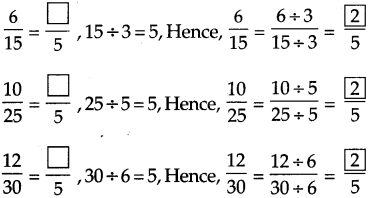
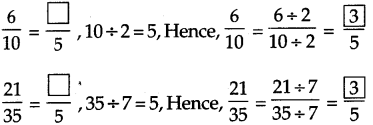
![]()

![]()

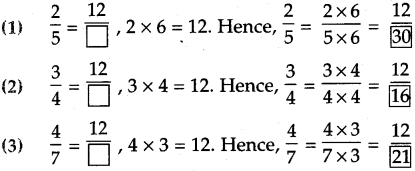

![]()

![]()
 . Therefore, 16/28 and 21/28 are the required like fractions.
. Therefore, 16/28 and 21/28 are the required like fractions.![]()
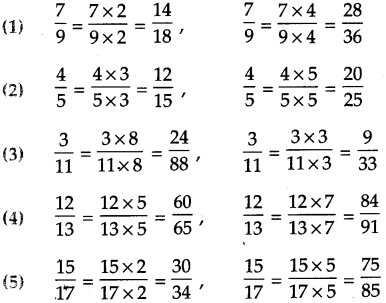

 So let us divide each part on this strip into two equal parts. \(\frac{4}{6}\) is a fraction equivalent to \(\frac{2}{3}\). Now, as 16 is to be added to \(\frac{2}{3}\) i.e. to \(\frac{4}{6}\), we shall colour one more of the six parts on the strip. Now, the total coloured part is \(\frac{5}{6}\).
So let us divide each part on this strip into two equal parts. \(\frac{4}{6}\) is a fraction equivalent to \(\frac{2}{3}\). Now, as 16 is to be added to \(\frac{2}{3}\) i.e. to \(\frac{4}{6}\), we shall colour one more of the six parts on the strip. Now, the total coloured part is \(\frac{5}{6}\).

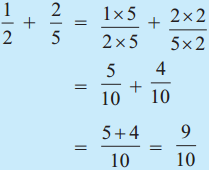
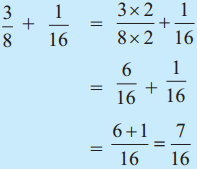
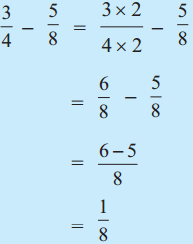
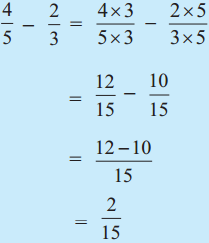

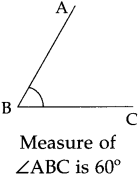
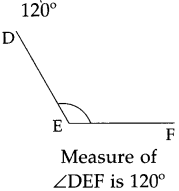
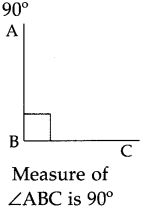
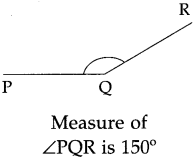
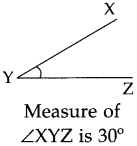
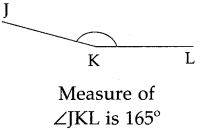
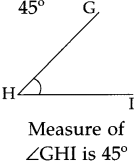
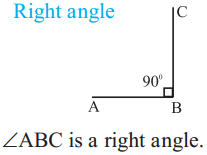

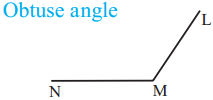
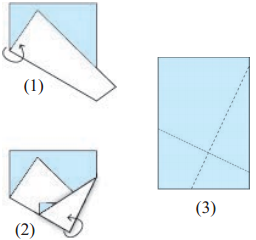
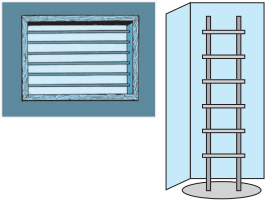









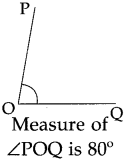
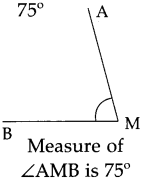
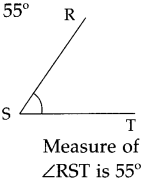

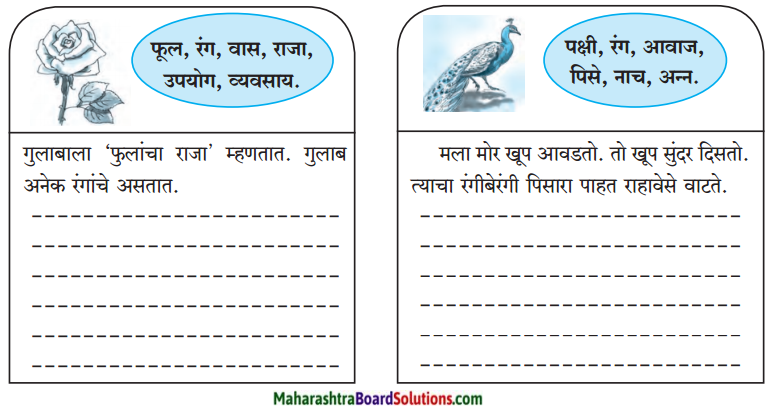
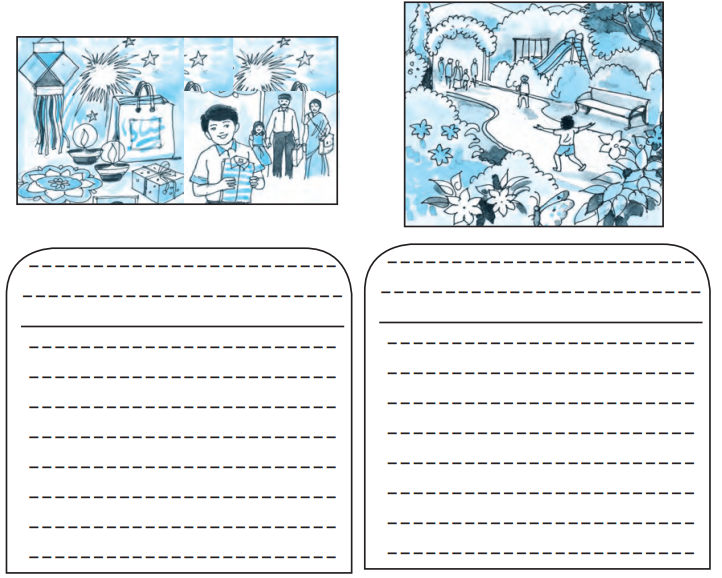
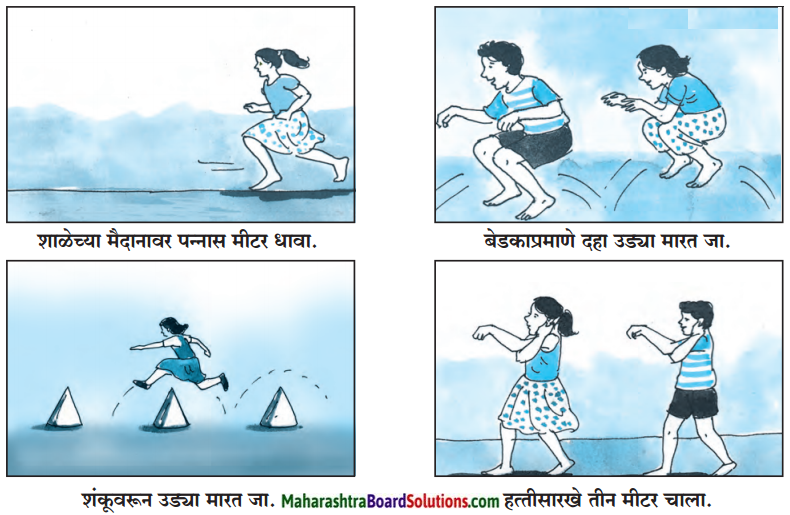
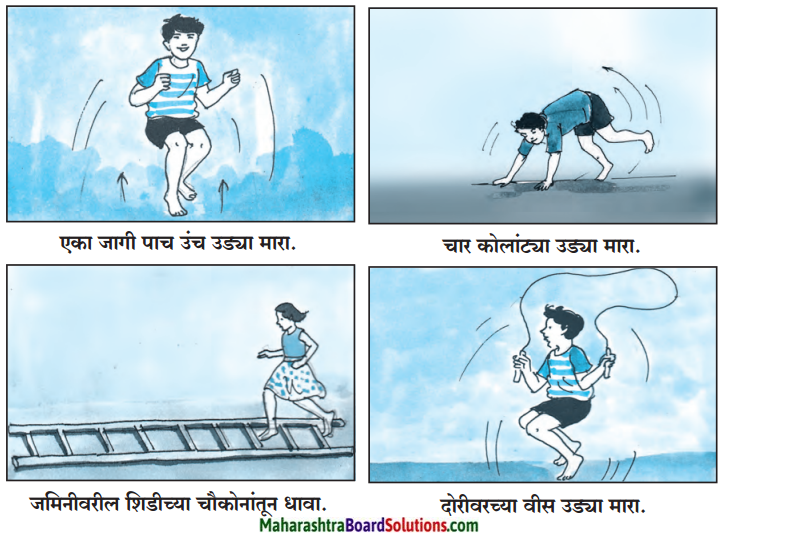
 उत्तर:
उत्तर: